#airbending teenagers being teenagers
Text
Chapter 37: fluffiness and weird dreams
“… there is greatness that everyone knows and then,” a pause. Jamyang looked around. Who said that? “there’s greatness that remains hidden and comes out when the time is right….”
It sounded like an old man. There weren’t any monks or any male presenting individuals around them. She’d dragged them off to a secluded part of the temple. Jamyang continued glancing around.
“Who said that?”
--
mostly fluff, young people spying on elder people being cute with each other and weird dreams
#a love in the eye of the hurricane#atla oc#oc centric#atla fanfic#atla oc fanfic#oc fanfiction#fic update#fanfic update#fanfiction update#fancfiction#airbenders & airbending#airbending teenagers being teenagers#airbenders being airbenders#like seriously#I have tags for each era now#kids teens and now just airbenders#oc jamyang#oc yara#oc gawa#oc jaya#old people being cute#Yara can’t believe an Elder actually likes a human#they’re adorable I love them#they’re my kids#pre yangchen era#stories from people at ordinary temples series
0 notes
Note
YOUR MEDIC!READER X JET HAS BREATHED LIFE INTO ME. MAKE THEM HOLD HANDS. I BEG. THE PINING IS INSANE. The atla jet fandom is DRY so you're doing god's work out here 😭 😭 (Or anything tbh! I'm absolutely in love with your writing 😭❤️)
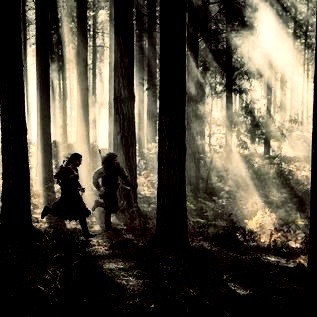


🌾 ・ HAND IN LOVING HAND
summ. Jet comes into a dawning realisation. It starts with a mission gone wrong.
pairing. Jet x f!medic!reader
w.count. 0.7k ( just a blurb! )
a/n. Ask and you shall receive! I’m so glad you love medic!reader as much as I do!

He figures, later, that it might have started with Operation: Creeping Cricket.
Courtesy to Smellerbee for the unique mission name, ofcourse.
That had involved, to date: A handful of Freedom Fighters itching for a fight, an imprisoned pair of orphan twins they’d planned to break out, a couple of dumb Fire Nation spies, and the leaky walls they called the borders of Omashu.
Except, ofcourse, it wouldn’t be a mission without a series of unfortunate events, of which occurred: a storm that changed Sneers’ accurately-predicted course of said Fire Nation spies, which meant their little hostages that they’d come to rescue would be headed down a different path, which also meant their traps lining on the trail towards the borders of Omashu— that The Duke had spent a frustratingly long amount of time setting up— would be rendered useless.
They settled on a brute force ambush instead, much to your disdain; you were, after all, a better healer than you were a fighter.
“This was a terrible—!” You pause to dodge a burst of white hot flames from a Fire Nation soldier. The rain is quick to dampen their efforts, luckily for you. “This was a terrible plan, Jet!”
He strains to hear you underneath the torrent. “Don’t blame me, Pipsqueak started it! Duck!”
You duck. Another spy crumples behind you, thanks to the swing of Jet’s tiger blades, and as the soldier lands on the ground— that’s when you notice it; the quaking rumble of earth, the jumping of stones.
Earth Kingdom Guards have caught wind.
In the distance, Longshot produces a birdcall from high above— shrill and piercing, one that’s rarely ever been used amongst the rebellion— a warning. Retreat. The Freedom Fighters are outnumbered. Scatter.
The ground erupts beneath you, and you scream. You practically sweep Jet off his feet as you snatch his hand and take off to higher ground to avoid the rising tempest. Hot on your heels, both of you can feel the snap and crackle of roots tearing deep underneath as the kingdom guards begin their manhunt.
“Quick!” you urge, as he trips over his footing. You glance at him over your shoulder, giving him a squeeze in your intertwined fingers as you check, “Hey, you hurt?”
“I— uh, no,” he stumbles, for some reason. Nothing but superficial cuts and bruises, anyway. He’ll live. “Yeah, I’m fine.”
It could’ve been minutes or an hour of just running, he isn’t quite sure— he’s too busy noting how your hands fit awfully perfect against his, and how despite the rain and muck, you still managed to look... collected. (Collected, he thinks, because he refused to admit anything unforgivably romantic.) Jet lets himself be led across the maze of woodland and grass, and catches himself wondering whether the hand holding had been a conscious move at all.
At the time, he’d decided it didn’t matter.
It shouldn’t, Jet had reasoned to himself, as you tugged him underneath an overhang and into a hidden crevice. Beyond the roguish charm and borderline flirtatious jokes he liked to play at— both of you were, at the end of the day, amidst an unending war. You were the Rebellions’ resident medic, and he was their token leader. There was no time to entertain fairytales and pipedreams.
“I think we lost them,” you pant, peeking over. “Do you think the others are okay?”
Jet looks at you, fights back the urge to tuck the rain-wet strands of your hair behind your ear so he can see your face better; how the light hits your profile and sets your eyes alight, down to the tip of your nose, and to your mud-stained cheeks. Collected. Capable, he reminds himself. Not pretty. Not pretty. Not—
“What’s wrong?” you ask, when you’d caught his gaze. “Jet?”
“Ah. Uh, nothing,” he blinks away— too fast; too quick to hide the obvious lie. “The others can handle themselves. Let’s, let’s wait for the storm to pass.”
This is simply camaraderie, he’d convinced himself, and stifled down the barb of disappointment that crept in him when you were the first to finally let go.
Right?

#wanna request? head to my rules first!#anyways.#THEY’RE SO DEAR TO ME WAHHHH#obsessed with the concept of suave/confident jet actually being completely out of his element when he’s genuinely falling for someone#TEENAGE BOY BEHAVIOUR#like CMON he’s just a hormonal teen let’s be real#atla jet#atla jet imagine#atla#avatar the last airbender#avatar: the last airbender#jet x you#jet x reader#jet atla#jet ff#jet fanfic#jet x oc#jet x y/n#jet imagine#atla live action#atla imagine#atla fanfic#live action jet#sebastian amoruso#🪷 ; atla#🪷 ; wishing well
243 notes
·
View notes
Text
The fear of being deemed as the most evil person in the world because I like Zutara is so real. The worst part of it is liking it while being a girl and a teenager. Like every time I post I am so scared of being canceled.
79 notes
·
View notes
Text
Lo and Li and their (not) looking after Azula and Zuko in "The Beach"
I have talked a lot about Zuko and Azula lately because “The Beach” episode gives a lot of context for their relationship, but it would be a crime to omit the most funny detail (implication) coming from this episode: the presence of Lo and Li.
Those two older women were introduced into the series as Azula’s teachers (that definitely fueled her unhealthy sense of perfectionism) and some sort of advisors before the princess recruited Ty Lee and Mai on the hunt for Zuko, Iroh and later, the Avatar. The story alone gives little about Lo and Li, but considering their relationship and influences on the princess, we can assume they had, if not outright trust, then at least Ozai’s approval to keep an eye on his “precious”, prodigy daughter. As they were the only adults connected to Fire Lord and at whose house the Royal Siblings and their friends stayed in "The Beach" episode, I thought of them as not really nannies, but more like chaperones.
Zuko and Azula faced Avatar and survived, Mai and Ty Lee proved to be capable of beating down full grown men one on one (or more precisely, one vs many). So fine, ok, Ozai may trust his kids to be able to defend themselves - if the thought about their safety even occurred to him at all. But Zuko and Azula are, and I can’t stress it enough, teenagers sent on vacation and teenagers may do stupid stuff for fun just to taste the little freedom granted them. So it makes sense to me that Lo and Li should supervise the Royal Siblings, because vacation or not, they are still prince and princess, the precious heirs to the throne. And like, Zuko is with his girlfriend (official fiancee?) and you can never be sure what teenagers in love and with buzzing hormones will do, right? Same with Azula, who as we learn through the episode, will happily grab the occasion to flirt with a handsome, popular boy and the innocent kiss turned out quickly into her passionate rant: “Together, you and I will be the strongest couple in the entire world! We will dominate the Earth!”.
Azula’s mind really jumped from casual fun (no harm done if Ozai won’t learn about it) to the conclusion that boy she knew for what? a few hours at best will be her boyfriend and part of the future (military?) plans and understandable Chen freaked out and ran away. The taste of freedom affected even Azula, our so emotionally composed, clever girl, because again, a teenager, adolescent curiosity, lack of supervision and buzzing hormones are a dangerous mix.
(I suspect Zuko getting Mai pregnant would be less scandalous than if Azula - the princess - ended with a bastard child at the age of 14/15. If Ozai would even allow the kid to be born.)
And what Lo and Li were doing the whole episode? Either giving some cryptic speech about how Ember Island is a magical place or encourage kids.
“Time to hit the beach!“ they said
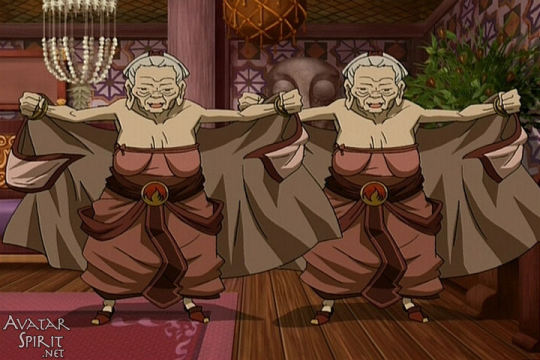
while never bothering going with kids there
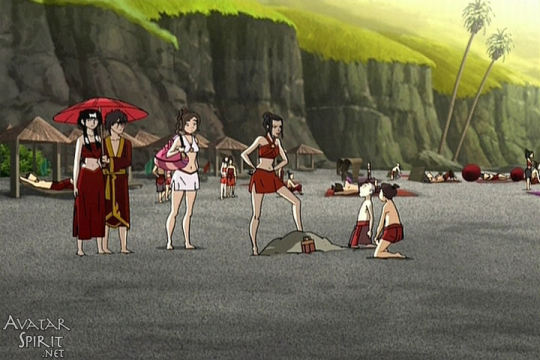
(or did Lo and Li have fun on their own ignoring the bunch of their temporary wards?).
And when Azula, Zuko and Ty Lee talked about Chen and why Azula didn’t betray their Royal Family status (and presumably of going to the night party)? Again, the two old women did nothing besides giving some more cryptic advice and saying “to the party!”.
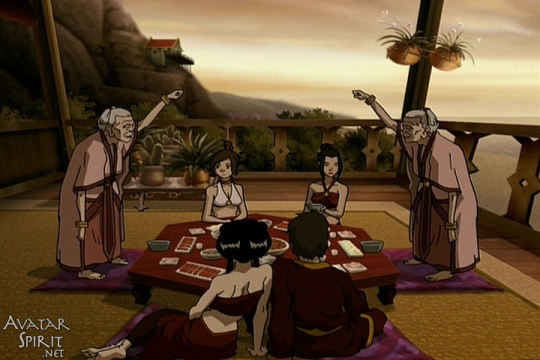
Like, they were totally okay that Fire Royal Siblings (in range of age from 14 to 16) planned to stay at house of unknown boy(s) for the whole night. Again, Zuko is 16, at best almost 17, but Azula is 14 (at best 15) and I don’t think this is an appropriate age to let a girl - especially the princess you are responsible for - go to a party with presumably much older boys.
(Unless this is why Azula demanded Zuko, her older brother, to be invited alongside her? Not like he checked out if she is alright before he was kicked out for the fight with Mai over some guy but I guess, with a sister like Azula it is easy to assume she doesn’t need babysitting, because Azula could and would kick Chen or anyone else’s ass if they pissed her off).
My point is, Lo and Li could give the girls and Zuko some serious talk or at least ask to be careful or anything the supposed chaperons should say (or like, outright demand from Zuko to keep an eye on his younger sister and the noble girls as the oldest and you know, the guy). Because Azula is first and foremost a princess, the same as Zuko is the prince and like, the Royal Family does not need any teenage drama and scandal (and from the previous episode we know Azula and Zuko are now the public figures at the capital).
I’m not sure if perceiving Lo and Li as some sort chaperons to the “banished for a weekend” Royal Siblings was author’s intention or not, but there is something incredible funny how those old women introduced as strict teachers criticizing Azula for not perfect hairstyle while she is working on her lighting technique - a skill absolutely amazing to have at the age of 14 - won’t even bother to keep an eye on the same girl and just let the whole bunch of emotionally stunted and traumatized teenagers freely roam on the “magical” beach and go to night party to total strangers. It is pretty hilarious if not a bit sad. Because wow, Ozai did not give much fuck about any of his kids one way or another.
Aaand this is what I get when rewatching ATLA as an adult lol.
I know this is animations for kids/teenagers, but what if Chen didn’t freak out? Would Azula be curious enough to experience something more than just a kiss? And well, we assume Chen and Ruon-Jian are in age close to Zuko & Azula (as if they were adults they would be enrolled into army, I think?) But there is still a room for them being older than Zuko who himself is two years older than Azula. Also, them inviting Ty Lee & Mai specifically for how they look without bothering to ask for their name and the way a group of boys cornered Ty Lee to the point she needed to chi-blocking all of them kinda gives me the feeling the party was an occasion for them to pick up girl for night or something along the way. Dunno if I read the scene/intention right but it gives that vibe I guess…?
#avatar: the last airbender#atla#lo and li#azula#zuko#the beach episode is so funny and so not-funny at the same time#like if i was responsible for a teenage girl (no matter it her father could kill me or not)#i would drill Zuko to make sure his younger sister is safe and sound#and no that she can take care of herself is not an excuse to let her be on her own with some random older dude#now i kinda wish that the party wasn't about zuko argument with mai but him being an older brother azula needs to bribe#to let her flirt with this hot dude and no don't tell dad or lo & li XD#i kinda guessing here lo and li looked at azula and assumed nope this girl has no interest in romances while of course she wouldn't tell#them she doesn't have a boyfriend because she had no clue how to talk to boys#Also it may be just me and my instict of keeping everyone safe at parties why “The party scenes” aren't my fav in this episode#Especially compared to the dance party in headband episode
32 notes
·
View notes
Text
What’s your favorite “extremely angsty 16 year old boy” thing that Zuko did?
My favorites are scream at god to just strike him with lighting already, and “WHAT ARE YOU OLD GASBAGS TALKING ABOUT?”
#Zuko#atla#avatar the last airbender#he was just like me at 16 for real#do you think he would listen to awolnation and fall out boy and think he’s so so edgy for it#trying to be a good boyfriend#but being a really really terrible one is pretty high on the list too#like he has the weight of the world on his shoulders#and so much trauma#but also he’s canonically pretty short like he hasn’t even hit his teenage boy growth spurt yet#he’s just short and angsty teen boy aldhskdhs
40 notes
·
View notes
Text
am i the only one who thinks that scene where jianzhu whispers into kyoshi's ear that he'll dedicate his life to her is extremely sus but wouldn't mind that he did it to me
#ok im gonna delete this now#im sorry#i read that scene and want to kick his ass but if it was to me#you know. cuz at least im not a teenager#avatar the last airbender#the rise of kyoshi#avatar kyoshi#jianzhu#edit: i know that he meant it as in being her mentor shush#the approach is odd nonetheless
20 notes
·
View notes
Text
I mean if we really want to go there
Canon makes a single exception for 'Zuko the true root of all morality and being nice to Zuko makes you too pure and perfect and good for this world.' That would be the point where his little sister overheard his father and his grandfather plotting his murder, warned him, warned his mother, and saved his life.
She is given a perfect license to kill him with the full sanction of her state and culture, brings him back in honor. She is rewarded for this with the loss of her friendship, her family, and her sanity.
Anyone with a halfway functional logical approach, post recovery to the breakdown, would reason that the one thing not to do under any circumstances is to repeat something that backfires on them this badly, in this specific way.
I do not understand how ATLA fanon convinced itself Azulon, the guy who perpetrated a second genocide, was just bluffing on the 'kill the kid' bit. The canon openly shows that he wasn't in the show. For the sake of her brother his sister saves his life and the comics demonize her and the show demonizes her for the heinous offense of......not letting daddy and grandpa kill her brother.
The second time she helps him, it goes from bad to worse.
Any post-canon Azula written like an actual human being would go full Diogenes and let Zuko alone to the mess he inherited and have a very deep fear that doing anything good for Zuko from past escalation would end in him rewarding her with actual death because how dare she do anything for him at all.
That is the logic of a show and a fanon where an empire unleashes a century of genocidal war but the true evil is not the army on the speartip of the genocide, nor the autocrats who set all this into motion and run it for all the same reasons as their real life counterparts...but instead it's a 14 year old who was mean to her brother a few times and halfway killed a physical god who got better.
So you tell me, why would anyone halfway human or logical, let alone fully so, operate on that basis postwar to go 'doing nice things for my brother has worked out so well for me before that clearly I should do more of it'.
Zuko has plenty of valid reasons to dislike Azula but she wasn't punished for any of those reasons, she was punished for DOING GOOD THINGS for him. Twice. That would be the major barrier to any postwar reconciliation and as written in the show, let alone the comics, it is by design nearly insuperable unless Zuko somehow finds in himself a self-awareness that his youth and reality rewarding him at every possible level and evading any actual facing of his own bad actions makes, shall we say, somewhat unlikely.
Autocrats who take thrones as teenagers and got away with attempted murder do not learn from this that this is bad, and they are surrounded by courtiers and the trappings of power in a way that would be hard to resist. The basis from here of 'family reconciliation' runs very hard into Zuko's hunger for throne and power in the actuals how, and it is something that would only change if given a sufficiently big hammer.
And that, in short, is why my post-canon scenarios have his rule of the Fire Nation blow up in his face in a decade as he's sixteen at the time he takes power and facing a situation an omniscient deity would find challenging and he's.....Zuko. Literally nothing about that postwar situation is sustainable and the way it would be all too probable to explode in everyone's faces would finally force Zuko to realize there is more to the universe than his own personal self-gratification and to examine everything canon shied away from because the ball of rage and resentment has become a singularity drowning the entire series in a paen to the redditbro mindset.
#avatar: the last airbender#zuko#man am i on a rant roll today#azula#ATLA canon has made very bad choices#its continuations have backed itself into a corner of being unable to admit they exist#if the characters are written as human that postwar 'happy ending' blows up in ten to twenty years max#teenagers picking apart the legacy of 100 years of war are guaranteed to fail#the consequences of that failure would be bloody#100 years of war leave plenty of angry soldiers willing to join a variety of extremist movements#these are the stories they could have told#instead you get a dollar store Batman tale with Azula as a poor man's Ra's Al Ghul meets the Joker
94 notes
·
View notes
Text
ATLA X One Punch Man crossover where pre-iceberg, ponytail!Zuko sees saitama punch smth and produce a shockwave so air-distorting he’s immediately like, “the avatar” with this squint on his face.
Then the camera cuts from their serious expressions to saitama’s deadpan, “eh?”
#cue saitama#confused as all hell after being isekaid into a world with badger-moles and squirrel-monkeys or wtvr#futiley trying to convince this random angry teenager that he’s not some avatar.#if i had art skills i would so draw this#somebody else pls do it lol#one punch man#atla#saitama#zuko#avatar the last airbender#opm#i meannn#yellow and red colour scheme—check#bald—check#air-bending skills—check#‘this is clearly an air nomad!!’—zuko
4 notes
·
View notes
Text
S1 Sokka is close to getting trapped in the alpha male podcast pipeline 😅
#lia thoughts#avatar the last airbender#don’t get me wrong he’s got his moments#but he’s such an annoying teenage boy#giving Aang advice on not being too nice to be attractive#I have faith in his journey though
1 note
·
View note
Text
I'm tired of people defining Aang as this boring little vanilla guy. Aang helped Katara destroy a factory. He participated in Toph's scams. He shrugged off Katara's theft of the waterbending scroll and heartily laughed at her jokes about it. He was delighted by the Painted Lady ruse. He mastered airbending at twelve and the avatar state at thirteen. He snooped around the old ship after Katara said it was booby trapped and dared her to follow and stepped up to take the blame when it went badly and then surrendered himself to protect the village because he knew he could hand everyone on that ship their asses and escape. He outright lied to two communities that had been bickering for a century to get them to stop. He egged on Katara when she decided to throw hands with Pakku. He wants to ride every big animal in the world ("they don't like being ridden but that's what makes it fun" -unhinged take). He has sick burns for everyone which are doubly funny because they're almost always unintended as such. He threw a clandestine dance party in the nation that banned dancing and thought he was dead and wanted him dead. Before that he corrected and argued with teachers, beat a bully without lifting a finger and then brought his teenage friends to pose as his parents. The whole Bonzu Pippipadaleopsicopolis the Third thing. The being idiots with Sokka in Ba Sing Se thing with the bowing and the busboys disguises. He rightfully asked "what's cosmic power compared to a girl". Let's add all the badass stuff he does as a bender and as the Avatar up to and including energybending and the conversation with Koh the Face Stealer. That time in The Chase when he finished the fur trail and then decided to just sit down, sleep deprived, to wait and face whoever it was chasing them. Aang is one of the funniest and coolest characters I've ever seen and he deserves more respect. Absolutely unhinged kid with immense powers and the world is lucky he's goofy and has a good heart.
8K notes
·
View notes
Text
Chapter 36: Jamyang has no idea what she’s doing.
Jamyang blinked.
Her eyes went from Gawa’s head, down to her feet and up again.
She stared for a few more seconds. Her brain wouldn’t formulate any words and what already was there died before it left her mouth.
Then there’s the spiritual energy of the temple buzzing beneath her skin, never leaving her alone. It’s a lot louder now.
She’s really not sure where Yara was at the moment, but she heard her giggling.
---
Jamyang mentions her first case of gay panic and has no idea what she's doing. On the other side there's Elder Jungney's letter and Sonam.
#I fell down the assassin’s creed hole yet again#currently playing Syndicate and Odyssey#a love in the eye of the hurricane#atla oc#atla fanfic#oc centric#fic update#fanfic update#fanfiction update#airbenders & airbending#atla oc fanfic#airbending teenagers being teenagers#Though they’re not so much teenagers anymore are they?#Jamyang is a leaf that floats in the universe#oc jamyang#oc yara#oc gawa#oc jaya#Jamyang had no idea what she’s doing and is promptly panicking because she wants to do well#Gawa is uneasy about getting compliments from other nuns from the Eastern air temple#The spring festival has a lot of music and dancing#pre yangchen era#stories from people at ordinary temples series
0 notes
Text
Here's the thing. I'm a girl, and as a girl, I really like it when girls are portrayed in fiction. Especially fantasy.
But so much fiction/fantasy mixes up 'girls' with 'unstoppable forces of female badass' and there's not necessarily anything wrong with having a character who is an 'unstoppable forces of female badass'. But it gets old real quick. And it is not the same as portraying normal girls, or having good female characters.
And that's one of the many reasons I love Avatar the Last Airbender.
Because all the girl characters have flaws and weaknesses and sometimes act like idiots or jerks. They get emotional and make mistakes. They lose fights or arguments or are just wrong sometimes. Some of them are amazing warriors, and some aren't. Some are powerful or special and some are normal, with nothing special about them.
And I Love that.
I was around the same age as Katara when I first watched Atla. And I instantly connected with her as a character. I loved her optimistic attitude and her fighting spirit. And I could relate with her anger, and with her maternal instinct. I admired her fighting skills of course, but I loved how the show portrayed her compassion and kindness, the way she could both beat up a bunch of bullies AND enjoy a relaxing day at the spa. She was a baddass warrior that should never be crossed. But she was also a normal teenage girl who had a lot of the same internal struggles and problems that I did.
(I never connected to Toph on the same level, but I did relate to her on a few things. She's an adorable trash gremlin who would commit any crime for fun and I love that. But she struggles with being both independent and letting people help her, and I still struggle with that sometimes. I've learned that sometimes, you can help others by letting them help you.)
Yue is, in my opinion, a perfect example of a type of hero that seems to be disappearing. She is not a warrior. She is not a fighter. She's not even a bender.
Yue is a perfect princess, a perfect daughter. She is extremely feminine in a rather older sense.
And she was the only one who could save the world. She gave up everything for her people. She saved everything, everyone, the entire world. Without ever becoming a fighter.
Yue is a perfect example of a girl who was never more than a girl, and how that's okay. Not every girl has to be rough and tumble and fight for her rights in order to change everything. Sometimes it's okay to just be a quiet obedient girly girl. Sometimes that's all it takes to be a hero.
And I love that. Yue is strong in her own way. She is unique and interesting. She appears in only a few episodes and yet manages to be one of my favorite characters.
Song is another great example of this. Song is a healer in a small town. We don't see much of her but we see her compassion and empathy. She is gentle and generous. A healer not a fighter.
She watches Zuko steal her ostrich horse and does nothing.
Is that because she's kind and generous and knows he needs it more? Or is it because she's a healer girl who knows she can't actually stop those two from taking the horse? Maybe neither, maybe both. I have always thought that the scene where Zuko steals the horse and only the audience knows she saw it is one of the most thought-provoking in the series.
Suki is a badass warrior woman who is an awesome fighter and good leader. She is one of the best non bender fighter we see in the entire show. She was one of the smartest, most efficient, and powerful characters we ever saw.
She kissed a boy she had just met because she thought he was cute.
Now don't get me wrong I love SokkaxSuki. Its one of the best couples in the show.
But Suki totally did the old 'love at first sight' thing. And that is awesome. Because when she kisses him she delivers one of the best lines, not only from her, but, I think, in the entire show.
"I AM a warrior, but I'm a girl too."
Being a warrior doesn't mean that she isn't also a teenage girl. She might be a fighter, but she still gets crushes and likes to flirt with cute boys. And hey, she picked a good one. Not every boy is going to come break you out of prison.
Anyways, let's have more realistic girls in fiction. And please enjoy the next 24 hours.
2K notes
·
View notes
Text
Katara's Story Is A Tragedy and It's Not An Accident
I was a teenaged girl when Avatar: The Last Airbender aired on Nickelodeon—the group that the show’s creators unintentionally hit while they were aiming for the younger, maler demographic. Nevermind that we’re the reason the show’s popularity caught fire and has endured for two decades; we weren’t the audience Mike and Bryan wanted. And by golly, were they going to make sure we knew it. They’ve been making sure we know it with every snide comment and addendum they’ve made to the story for the last twenty years.
For many of us girls who were raised in the nineties and aughts, Katara was a breath of fresh air—a rare opportunity in a media market saturated with boys having grand adventures to see a young woman having her own adventure and expressing the same fears and frustrations we were often made to feel.
We were told that we could be anything we wanted to be. That we were strong and smart and brimming with potential. That we were just as capable as the boys. That we were our brothers’ equals. But we were also told to wash dishes and fold laundry and tidy around the house while our brothers played outside. We were ignored when our male classmates picked teams for kickball and told to go play with the girls on the swings—the same girls we were taught to deride if we wanted to be taken seriously. We were lectured for the same immaturity that was expected of boys our age and older, and we were told to do better while also being told, “Boys will be boys.” Despite all the platitudes about equality and power, we saw our mothers straining under the weight of carrying both full-time careers and unequally divided family responsibilities. We sensed that we were being groomed for the same future.
And we saw ourselves in Katara.
Katara begins as a parentified teenaged girl: forced to take on responsibility for the daily care of people around her—including male figures who are capable of looking after themselves but are allowed to be immature enough to foist such labor onto her. She does thankless work for people who take her contributions for granted. She’s belittled by people who love her, but don’t understand her. She’s isolated from the world and denied opportunities to improve her talents. She's told what emotions she's allowed to feel and when to feel them. In essence, she was living our real-world fear: being trapped in someone else’s narrow, stultifying definition of femininity and motherhood.
Then we watched Katara go through an incredible journey of self-determination and empowerment. Katara goes from being a powerless, fearful victim to being a protector, healer, advocate, and liberator to others who can’t do those things for themselves (a much truer and more fulfilling definition of nurturing and motherhood). It’s necessary in Katara’s growth cycle that she does this for others first because that is the realm she knows. She is given increasingly significant opportunities to speak up and fight on behalf of others, and that allows her to build those advocacy muscles gradually. But she still holds back her own emotional pain because everyone that she attempts to express such things to proves they either don't want to deal with it or they only want to manipulate her feelings for their own purposes.
Katara continues to do much of the work we think of as traditionally maternal on behalf of her friends and family over the course of the story, but we do see that scale gradually shift. Sokka takes on more responsibility for managing the group’s supplies, and everyone helps around camp, but Katara continues to be the manager of everyone else’s emotions while simultaneously punching down her own. The scales finally seem to tip when Zuko joins the group. With Zuko, we see someone working alongside Katara doing the same tasks she is doing around camp for the first time. Zuko is also the only person who never expects anything of her and whose emotions she never has to manage because he’s actually more emotionally stable and mature than she is by that point. And then, Katara’s arc culminates in her finally getting the chance to fully seize her power, rewrite the story of the traumatic event that cast her into the role of parentified child, be her own protector, and freely express everything she’s kept locked away for the sake of letting everyone else feel comfortable around her. Then she fights alongside an equal partner she knows she can trust and depend on through the story's climax. And for the first time since her mother’s death, the girl who gives and gives and gives while getting nothing back watches someone sacrifice everything for her. But this time, she’s able to change the ending because her power is fully realized. The cycle was officially broken.
Katara’s character arc was catharsis at every step. If Katara could break the mold and recreate the ideas of womanhood and motherhood in her own image, so could we. We could be powerful. We could care for ourselves AND others when they need us—instead of caring for everyone all the time at our own expense. We could have balanced partnerships with give and take going both ways (“Tui and La, push and pull”), rather than the, “I give, they take,” model we were conditioned to expect. We could fight for and determine our own destiny—after all, wasn’t destiny a core theme of the story?
Yes. Destiny was the theme. But the lesson was that Katara didn’t get to determine hers.
After Katara achieves her victory and completes her arc, the narrative steps in and smacks her back down to where she started. For reasons that are never explained or justified, Katara rewards the hero by giving into his romantic advances even though he has invalidated her emotions, violated her boundaries, lashed out at her for slights against him she never committed, idealized a false idol of her then browbeat her when she deviated from his narrative, and forced her to carry his emotions and put herself in danger when he willingly fails to control himself—even though he never apologizes, never learns his lesson, and never shows any inclination to do better.
And do better he does not.
The more we dared to voice our own opinions on a character that was clearly meant to represent us, the more Mike and Bryan punished Katara for it.
Throughout the comics, Katara makes herself smaller and smaller and forfeits all rights to personal actualization and satisfaction in her relationship. She punches her feelings down when her partner neglects her and cries alone as he shows more affection and concern for literally every other girl’s feelings than hers. She becomes cowed by his outbursts and threats of violence. Instead of rising with the moon or resting in the warmth of the sun, she learns to stay in his shadow. She gives up her silly childish dreams of rebuilding her own dying culture’s traditions and advocating for other oppressed groups so that she can fulfill his wishes to rebuild his culture instead—by being his babymaker. Katara gave up everything she cared about and everything she fought to become for the whims of a man-child who never saw her as a person, only a possession.
Then, in her old age, we get to watch the fallout of his neglect—both toward her and her children who did not meet his expectations. By that point, the girl who would never turn her back on anyone who needed her was too far gone to even advocate for her own children in her own home. And even after he’s gone, Katara never dares to define herself again. She remains, for the next twenty-plus years of her life, nothing more than her husband's grieving widow. She was never recognized for her accomplishments, the battles she won, or the people she liberated. Even her own children and grandchildren have all but forgotten her. She ends her story exactly where it began: trapped in someone else’s narrow, stultifying definition of femininity and motherhood.
The story’s theme was destiny, remember? But this story’s target audience was little boys. Zuko gets to determine his own destiny as long as he works hard and earns it. Aang gets his destiny no matter what he does or doesn’t do to earn it. And Katara cannot change the destiny she was assigned by gender at birth, no matter how hard she fights for it or how many times over she earns it.
Katara is Winston Smith, and the year is 1984. It doesn’t matter how hard you fight or what you accomplish, little girl. Big Brother is too big, too strong, and too powerful. You will never escape. You will never be free. Your victories are meaningless. So stay in your place, do what you’re told, and cry quietly so your tears don’t bother people who matter.
I will never get over it. Because I am Katara. And so are my friends, sisters, daughters, and nieces. But I am not content to live in Bryke's world.
I will never turn my back on people who need me. Including me.
#ATLA#Avatar the Last Airbender#Katara#Anti Bryke#Zutara#but not really#just pro-Katara#Anti Kataang
2K notes
·
View notes
Text
The Trick To Writing Filler
(TL;DR at the bottom)
Filler is when you spend a chapter padding the length of your story between plot-related events. Filler chapters have little to no impact on the overarching plot and can be self-contained, and thus in TV shows filler episodes are often reran the most as people unfamiliar with the show can casually watch without being confused without the knowledge of prior plot beats
So with the chapter being largely self-contained and acting outside of the plot, what do you use to make the filler chapter engaging? I’m going to use filler episodes from Avatar: The Last Airbender to provide examples
1. Worldbuilding. Zuko Alone depicts Zuko’s travels taking him through an Earth Kingdom village and becoming acquainted to the family that allows him to stay with them, especially their young son. He learns about what the Fire Nation’s impact on this village has been; destroyed houses, families torn apart, constant robbery and other abuses of power and injustices. And even after Zuko defends the villagers and his new friend, he’s venomously cast out from the village by even the little boy because he outed himself as a firebender. This episode explored the impact of the war on the people of the Earth Kingdom, the victims of war that have no involvement in it and no way of defending themselves from it
2. Character exploration. In The Beach, we learn more about Mai, Ty Lee, Azula and Zuko and how their own traumas and personal upbringings have impacted their personalities. For Zuko this is part of a turning point for him, but for the girls it’s more to understand why they are the people we’ve gotten to know over the seasons, especially Ty Lee and Mai. The episode also serves to showcase how Azula and Zuko are so out of place being just normal teenagers; Azula has no idea how to talk to her peers and no identity outside being Princess Azula of the Fire Nation, while Zuko’s hotheadedness and jealousy issues lead him to lash out and be far too confrontational and controlling for his own good. This episode isn’t really used to develop these characters, or at least not the girls, but instead explains and showcases their behaviours and the reasons behind them
3. Character development. Going back to The Beach, Zuko does indeed receive development rather than just character exploration like the girls do; he comes to understand that he’s not just angry at the world or angry in general, but angry with himself. This is a notable turning point for Zuko’s redemption arc, because he now understands fully that he truly regrets betraying Iroh and sacrificing his new start in life in favour of returning to the Fire Nation. He might not yet be fully decided on turning his back on Ozai, but without this moment I don’t know if he’d have gotten there, or at least not as quickly as he did
4. Relationship development. Sokka’s Master has a C plot of Aang, Katara and Toph all being rather bored and lost without Sokka’s presence. The A plot exploring Sokka’s feelings of inadequacy and uselessness in comparison to such powerful and formidable bending masters being contrasted with the Gaang unable to function without him already speaks volumes about their dynamics, but looking deeper into the C plot also shows how much value Sokka really does bring to the team; structure, planning, humour, a quick wit, strategic moves. The Gaang always supported Sokka and never seemed to view him as expendable outside of the occasional teasing, but having it acknowledged so clearly and plainly that they can feel a little aimless and flat without Sokka and being so delighted when he returns really shows us the kind of value Sokka brings to this team and brings us and the characters to further appreciate it
5. Downtime. The Ember Island Players depicts the characters taking a break to watch a comedic play based on their wacky adventures, only to be largely underwhelmed and displeased by how they’re portrayed. There are no stakes to this episode and barely any plot, just the Gaang taking a breather as they react to a bad play. This chance to relax and watch something inconsequential is just as important to the viewers as we’ve got the show’s finale in the next four episodes, which will be very plot-driven and intense. The Ember Island Players also has the additional viewer bonus of recapping the events of the show right before it all ends, giving the viewers time to reflect on the journey they’ve gone on with these characters. In order for the stakes to feel high and the tension to rise, there has to be downtime where there are low stakes and low tension; if things are intense all the time, the moments that are supposed to feel super intense will just feel average in comparison. Resetting that intensity right before such a big event while still acknowledging the looming threat coming soon will feel like the calm before the storm and allow your audience to soak it all up like the characters are
Wow, did I just go through all that without talking about Tales of Ba Sing Se? I’ll save that for another post if people are interested in more
TL;DR - filler provides a moment to breathe, reset the intensity levels the audience are experiencing and take a chance to step away from the external conflict (the overarching plot) in favour of worldbuilding and the characters within your setting. Small moments can amount to something big, and can help make large scale decisions or plot twists feel more build-up and in-character
#filler#worldbuilding#character development#avatar the last airbender#atla#writing#writers#writeblr#bookblr#book#writers on tumblr#writerscommunity#writers of tumblr#writer#how to write#on writing#creative writing#write#writers and poets#female writers#queer writers#writblr#writer things#writing tips#writerscreed#writing advice#writing life#writer stuff#writersnetwork#writer problems
427 notes
·
View notes
Text
After rewatching ATLA and rewatching the first couple episodes of Korra I'm always reminded of how much they fucked Korra over by training her inside a compound in the South Pole for thirteen years. I understand that they wanted to keep her safe from the Red Lotus but like. The Avatar is supposed to travel to the other nations to learn their element, but it's more than that: it's about travelling, learning the culture of each nation, their customs, meeting its people, its leaders-- that way, by the time the Avatar has mastered all elements, they also know how the world works, so they know how to protect it.
But Korra? She spent her entire childhood and teenage years locked up in a compound where she was watched all the time. She was only allowed to go out once a year for the Spirit Festival, and once she even had to escape to go because one of her teachers didn't wanna let her go. Her only friends were Katara, her parents and her polar bear dog; she didn't have any actual friends her age until she met Bolin, Mako and Asami.
Of course she struggled with airbending and her spiritual side: it's not just her personality, it's that air is the element of freedom, and she's been locked up with people constantly making decisions for her her entire life. She is just learning what freedom is like.
Of course she acted like that in Republic City in the first episode; it was her first time actually being out in the world. She doesn't know how it works, its rules or how its people struggle because she didn't get to even see it before! Of course she acted like that during ALL of Book 1. If Korra had travelled like she was supposed to, she would have probably acted like her Book 3 self by Book 1: still a teenager, still fierce and still kinda stubborn, but with a better understanding of the world and what being the Avatar means, and of who she is. But no. By raising her like that they strained both her training and her personal growth.
1K notes
·
View notes
Text
whenever someone says they dislike huntlow, the usual comeback from toxic huntlow fans is that “you're a misogynist and you don't want to see the woman in a relationship being stronger”. so i want to address this issue today. is huntlow bad only because willow is stronger than hunter and isn't a damsel in distress?
in my opinion, absolutely not. that's not the case. i myself am a fan of subverted tropes and relationships where the woman isn't just a passive damsel with no personality. i like seeing independent women and i like seeing men being vulnerable for once.
to demonstrate my point on why huntlow doesn't pull off this trope well, let me compare it to a ship with a similar dynamic: sokka and suki from avatar the last airbender.
let's go through each of the reasons why sukka works as a ship where huntlow fails.
1. Does it make sense for the characters?
the first question here is: do the roles of the strong independent woman and weaker man suit these characters?
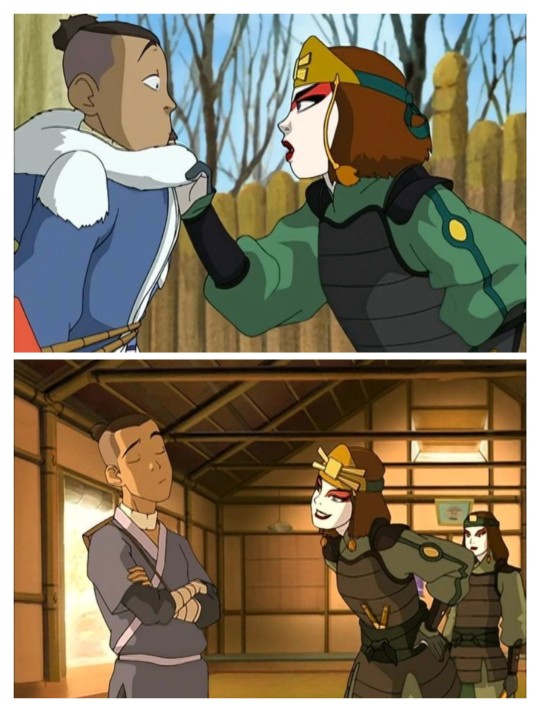
sokka was introduced as.. just a guy. he was a regular teenager who wasn't trained in combat. he could fight well enough if he wanted to and being the only man in a village full of mostly children and elders, he was the best warrior in his village (if we are even to believe his claims in s1, that is).
suki, on the other hand, was a trained warrior. she had spent her whole life training in combat and fighting to continue kyoshi's legacy. in her very first appearance, suki is confirmed to be a skilled warrior who is much stronger than sokka.
this setup makes perfect sense. it wouldn't come as a surprise later on that suki is stronger or a better fighter than sokka, and would have to rescue him or help him out in a moment of crisis.
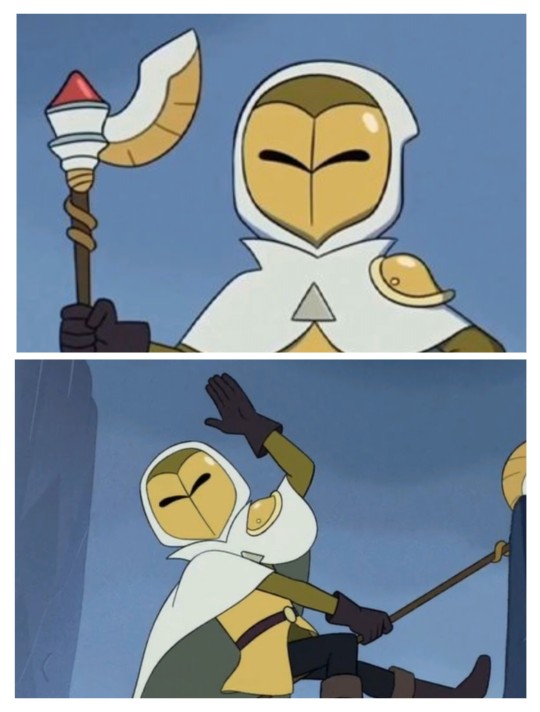
now let's come to huntlow. in s2, hunter is introduced as the emperor's right-hand man who is young but powerful. while most of his intimidation factor came from his artificial staff, it was clear that he was not an amateur and had decent combat skills.
this assumption is only solidified when we see him go head to head with amity, only losing because 1. he was using a new staff 2. he was sleep deprived and 3. he was in an extremely erratic emotional state.
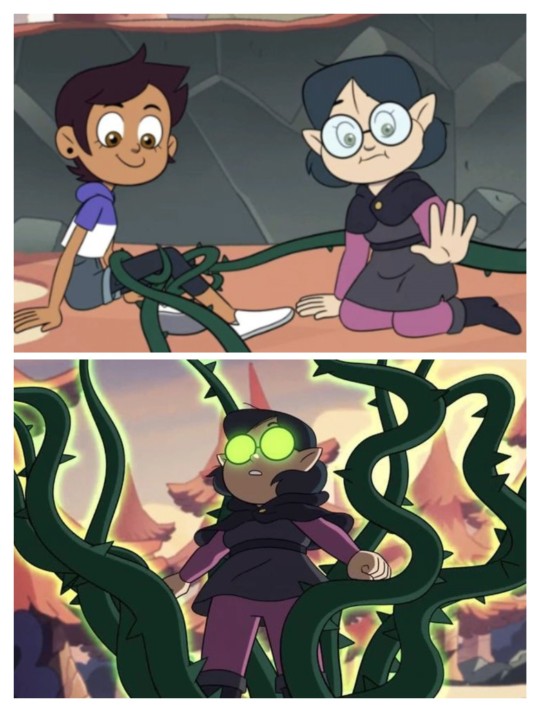
willow, on the other hand, was the sokka in this relationship. she was a regular teenager who grew up in a normal family and went to a regular magic high school.
she was certainly incredibly skilled in plant magic but she was not a trained child soldier like hunter. she had a lot of potential to be a good fighter but she had only recieved the education that every other student had recieved. not to mention, most of her stronger magic came from her emotional outbursts.
so.. does the whole girlboss-malewife dynamic work with huntlow? no. it really doesn't. even if willow trained and grew as a witch, there's no reason why she should be stronger and more skilled in combat than hunter, who had to pass seemingly impossible trials in order to qualify as the golden guard. especially since after the first half of s2, hunter was not only weaker than willow but just weak in general.
i get it, he doesn't have natural magic like the others. but he was still shown to be a very competent fighter. he was also shown to be cunning and strategic, being able to find a way out of any situation if he wanted to. but after joining the hexsquad, he is dumbed down to willow's shy and pathetic boyfriend, who doesn't really do much on his own.
2. are they in character when in a relationship?
when writing a relationship, this is really important. if you write a relationship where one or both characters have to act wildly out of character to make sense for the relationship to happen, those characters are not compatible. it's like when your friend acts uncomfortably different around their crush or partner.
let's start with sokka and suki.
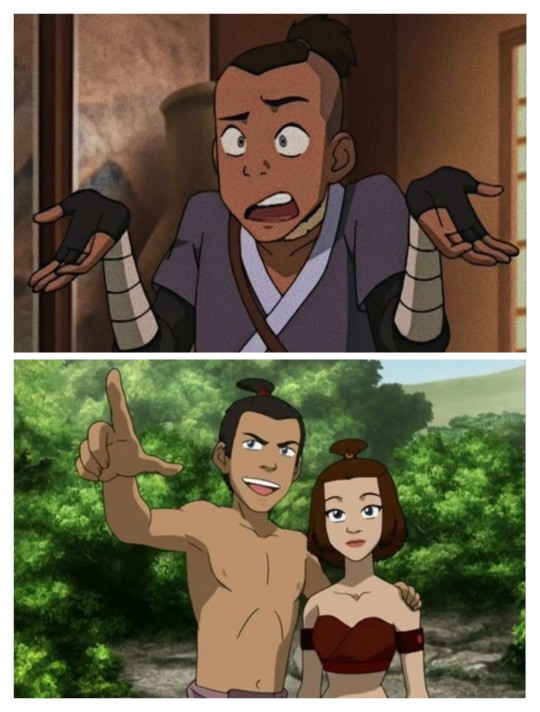
sokka is goofy, cynical and quick-witted, with or without suki. his relationship with suki doesn't drastically change his character, but it does improve it. suki helps sokka change his misogynistic worldviews and respect women, but apart from that necessary improvement, sokka is still the same. he is not out of character when he is with suki.
as for suki herself, we don't see a lot of her away from sokka but it's still safe to assume that she is being herself around sokka. she is not forced into a new role in order to be in a relationship with sokka. the times we do see her on her own, she is pretty much the same rational, independent and nonchalant person that she is around sokka.
and yet, both of them have incredible chemistry and very clearly care for each other. it's not one-sided and it doesn't feel unnatural.
but huntlow?
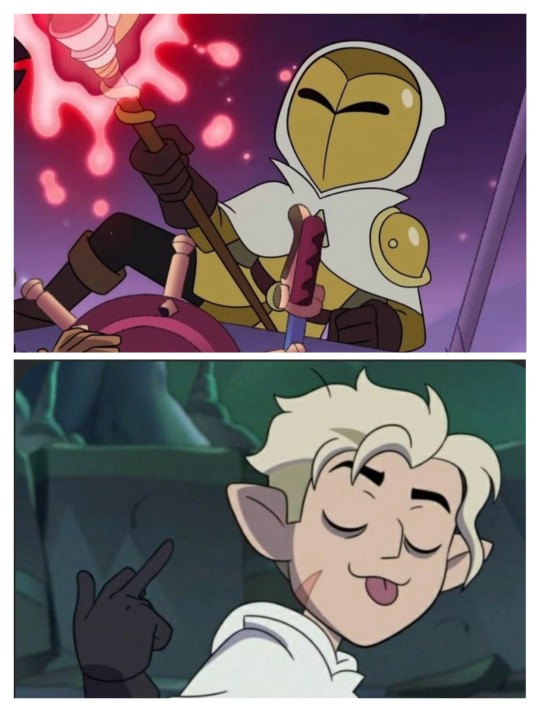
hunter is introduced as a sarcastic and bratty but deeply traumatized teenager. he is quick to start a banter with whoever he is with, he tends to talk too much, and he generally has a nonchalant attitude to cover up with trauma.
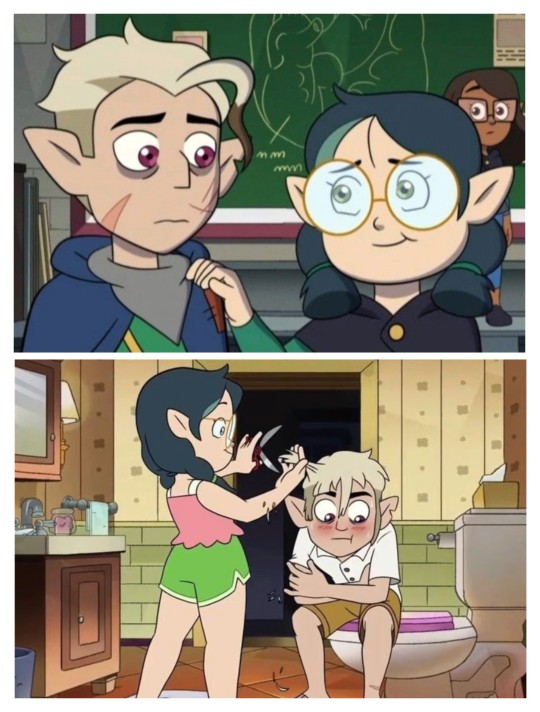
but with willow? hunter is not just shy or awkward around her, he is a completely different person. i can understand that being attracted to a person can make you act strangely sometimes. but with hunter, that awkwardness never fades away. he is always blushing around her, he is often portrayed as pathetic and helpless, and constantly needing willow's support and guidance.
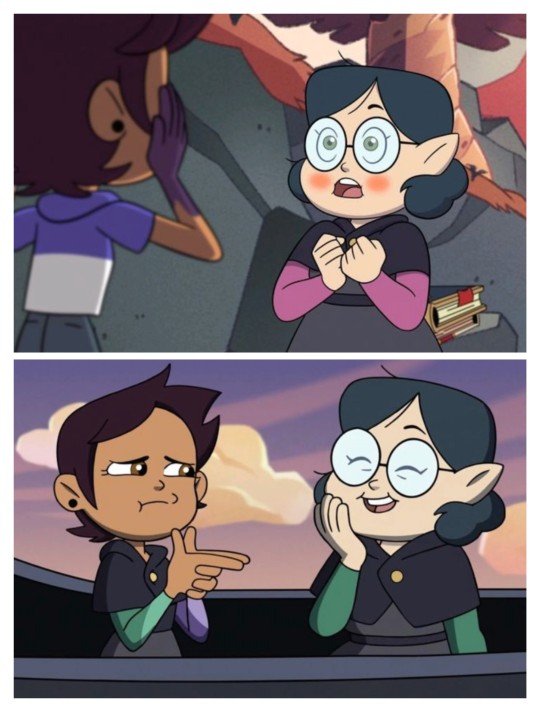
as for willow, she is introduced as this insecure and good-natured teenager. after her confrontation with amity, willow is pushed to the back for a while. all we know about her at that time is that she's the supportive mom friend of the group. she builds her confidence after a while but she is still shown as a kind person who doesn't use force on someone else, unless necessary.
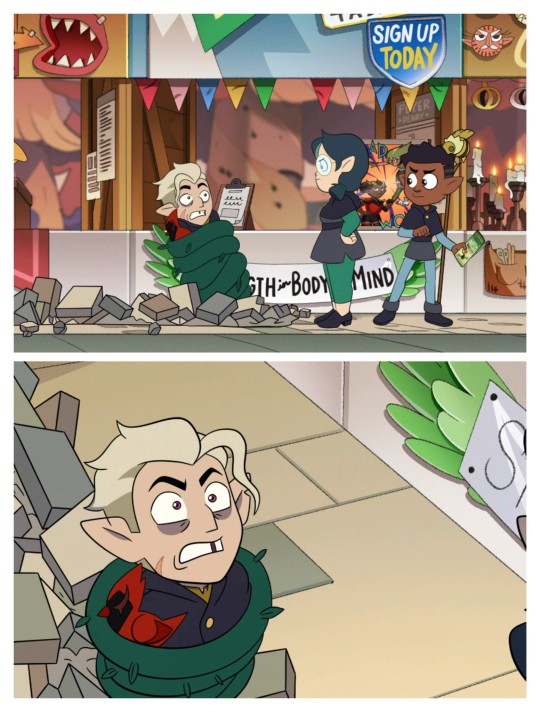
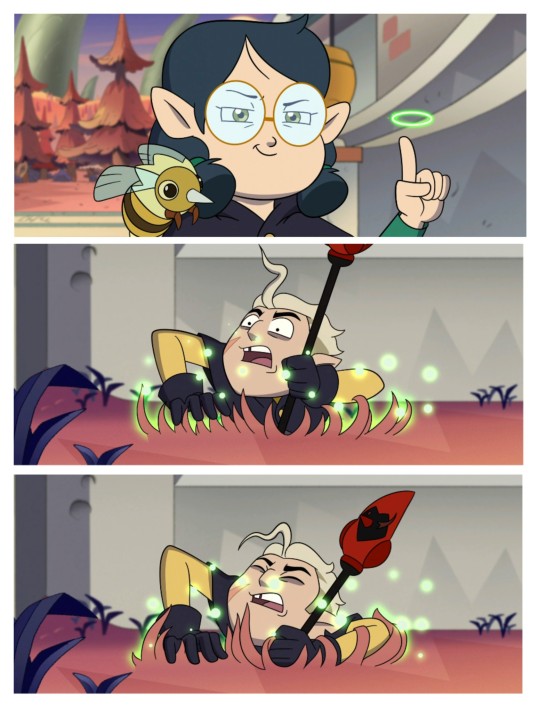
but with hunter? willow is suddenly not just confident but also dominant and forceful. she basically snatches him from the sky and drags him to the ground, just to invite him to her flyer derby team. hunter is practically terrified at this point, but it's played off as a fun cute-meet. later, when hunter wants to leave the team for understandable reasons, instead of respecting his wishes, willow once again forces him to join her again.
i wouldn't call willow toxic or abusive, because she isn't. but i would say that she didn't respect hunter's boundaries in the slightest. she doesn't treat anyone else the way she treats hunter. she's not exactly mean to him but she also does not seem to respect him as an individual. again, she is written wildly out of character just so that she could fulfil the role of the “powerful girlboss” in the relationship. and it doesn't help that a dominant and forceful figure is the last thing hunter needs, considering how he was controlled and abused by his uncle his whole life.
3. Equality
it is my opinion that in a relationship, both individuals should play an important role. and they should balance each other out, instead of clashing with each other. it doesn't necessarily have to be an “opposites attract” situation, they just need to have qualities that brings a balance to the relationship.
in sokka's and suki's relationship, we've already established that suki is the brawn. she's the trained warrior and her agility, skill and speed are her strengths. sokka, on the other hand, is the brains. suki is still a rational and smart person but sokka is the strategist, the “idea guy”.
here, there's a balance. neither sokka nor suki are weak or incompetent, they're just skilled in different areas.
but when it comes to huntlow, willow is the brawn while hunter.. does close to nothing. after meeting willow, he's basically useless. the most impactful thing he does is stand up against belos in “Thanks to Them” and rescue willow from a short fall in the next episode. otherwise, he is mostly pushed to the back despite, again, having a personality and his own strengths prior to meeting willow. the problem here isn't that hunter shouldn't be weak or vulnerable, but rather that he is forced into the damsel role when it goes against his original character.
4. Screentime, interaction and development
one thing that huntlow and sukka had in common is neither ship had too much screentime together. suki wasn't officially part of the gaang until s3 and before that, she just gets two interactions with sokka. but these interactions were used to their fullest potential.
when they first meet each other, sokka and suki do not get along well. sokka was convinced that women aren't good warriors and his pride is hurt by the fact that suki is stronger than him, while suki is understandably put off by sokka's misogynistic and condescending attitude. after he tries to teach her how to fight and is consequently defeated by her, sokka rethinks his worldview. he goes back to suki and asks her to teach him how to fight, apologizing and admitting his mistake. suki agrees to teach him and through this, they bond. it is revealed at the end of the episode that both sokka and suki may or may not have a thing for each other. afterwards, sokka has to leave and suki has to stay behind.
their next meeting is a lot more brief but even here, we see a clear demonstration of their dynamic. sokka is overjoyed to see suki but he still hasn't moved on from yue, so when suki confesses to him and tries to initiate a kiss, sokka rejects her. suki apologizes to him later for what happened, and sokka kisses her as a confirmation that he has now moved on and likes her back. we see a clear respect of boundaries and personal choices from both sides.
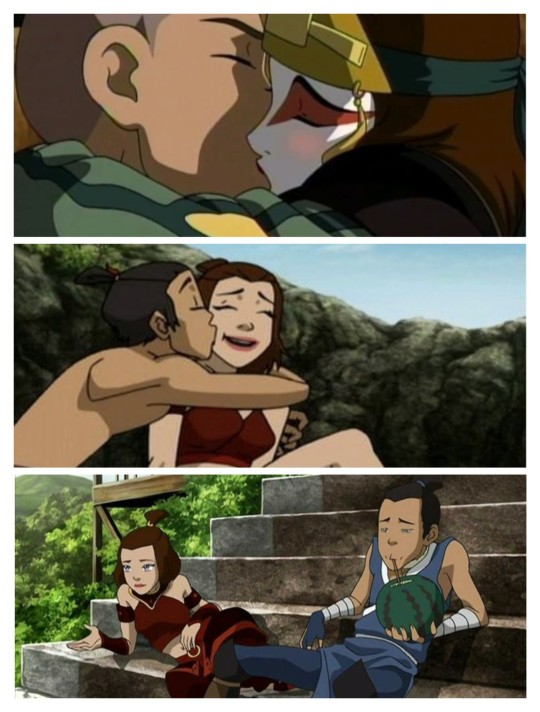
finally, after suki is captured by azula, sokka frees her and they are reunited again until the end. at this point, they're basically a couple. there's no more awkward blushing or stuttering; they're just a pair of teenagers who are in love with each other. they have a bit of playful banter and they're very casual and comfortable around each other.
suki was originally supposed to be a one-time character so it's incredible that they pulled off on the best ships in atla with her and sokka. their chemistry was undeniable from the beginning, and the writers knew how to expand on it.
now let's come to huntlow. hunter and willow meet each other for the first time in the s2b episode ‘Any Sport in a Storm’. willow is looking for candidates to join her flyer derby team and she sees hunter flying on his palisman. completely unprovoked, the willow who normally never attacked or forced something on people for no reason, decides that the best way to scout this random guy she doesn't know is by encasing him in vines and dragging him to the ground, destroying the concrete in the process. this may have been portrayed as something of a slapstick comedy, but that kind of humor never stuck with me.
after willow explains herself to hunter, he agrees to join her team, thinking it would be an easy way to recruit students into the emperor's coven. fast forward, they get a few members to their group.
hunter notices that all of these members are visibly slacking off and gets discouraged. he turns to leave and willow stops him in his tracks. when she tells him to give them a chance, hunter ‘opens up’ to her a little, by telling her that he had to earn chances, especially as a “half a witch”. this comes out of nowhere because we never see hunter being referred to as half a witch by anyone prior to this. there were certainly characters who disliked him, like lilith and kikimora, but they called him names like “golden brat”. in fact, it's not even clear if anyone other than hunter and belos knows that he has no magic. the whole half a witch line was added so that hunter and willow would have something in common.
willow, instead of reasoning with hunter or respecting his choice to leave, drags him to the ground once again and seemingly teleports him back to the flyer derby team. while this may not have been done with malicious intent, it was still another instance of willow invading hunter's boundaries and forcing him to do something.
hunter is convinced that the team is, in fact, competent. he plays the game with them and has fun doing it. after getting the team captured to join the emperor's coven and saving them from darius, the episode ends with darius turning out to be the good guy and hunter getting a penstagram (or whatever they call it, i forgot).
after this, the huntlow scenes are very scarce. we barely see them interact, especially not alone with each other. in the next episode, we see willow standing up for hunter and hunter blushing and recognizing that the fake willow isn't willow. while this would be sweet for an already established couple, since hunter and willow barely had a bond at this point, it just comes off as hunter being observant. which is somewhat in character for him.
afterwards, there's just a sprinkle of this ship, most of it consisting of hunter being shy and nervous around willow. and willow treating him like she treats everyone else. there's no sign of willow liking hunter back until literally the episode before the finale. where, instead of focusing on hunter's recent trauma with being possessed by his abusive parent and losing his best friend, the show decides to focus on willow's issues instead. of course willow deserves her own arc, but she already got it back in s1. there was no reason to give her ANOTHER issue to work on, just so that hunter can comfort her and give her a reason to like him back.
overall, it was really forced and these two characters never had the kind of natural chemistry that sokka and suki did. their interactions were either awkward or surface-level wholesome. we get exactly two (2) episodes where they interact properly and even that isn't done well. it just feels like these characters were pushed into a ship dynamic that they didn't naturally fit into.
#anti toh#toh criticism#toh critical#toh discourse#toh salt#anti huntlow#anti huntl0w#toh#atla#avatar the last airbender#the owl house spoilers#the owl house salt#the owl house criticism#the owl house critical#the owl house discourse#the owl house
188 notes
·
View notes